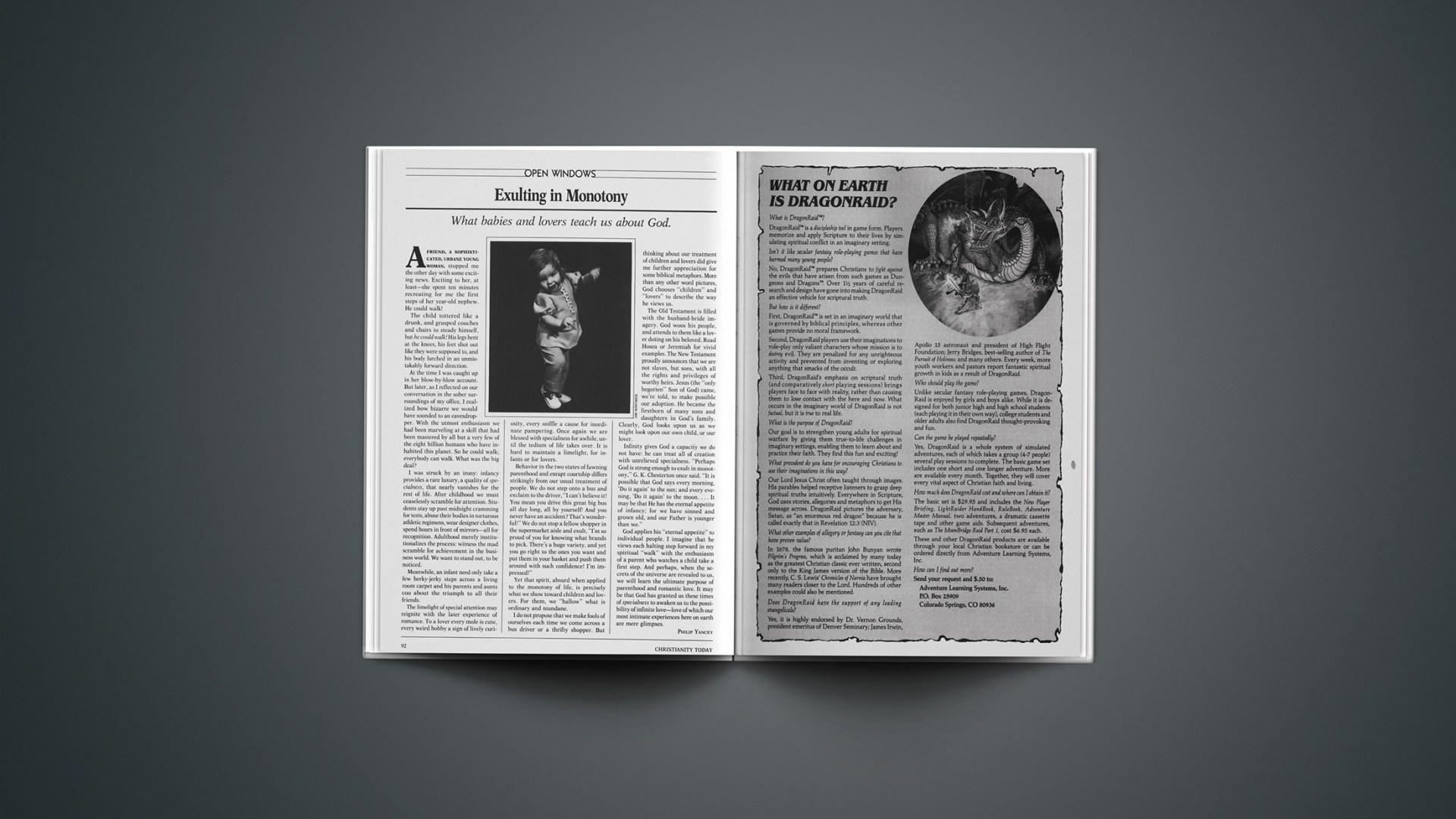What babies and lovers teach us about God.
A friend, a sophisticated, urbane young woman, stopped me the other day with some exciting news. Exciting to her, at least—she spent ten minutes recreating for me the first steps of her year-old nephew. He could walk!
The child tottered like a drunk, and grasped couches and chairs to steady himself, but he could walk! His legs bent at the knees, his feet shot out like they were supposed to, and his body lurched in an unmistakably forward direction.
At the time I was caught up in her blow-by-blow account. But later, as I reflected on our conversation in the sober surroundings of my office, I realized how bizarre we would have sounded to an eavesdropper. With the utmost enthusiasm we had been marveling at a skill that had been mastered by all but a very few of the eight billion humans who have inhabited this planet. So he could walk; everybody can walk. What was the big deal?
I was struck by an irony: infancy provides a rare luxury, a quality of specialness, that nearly vanishes for the rest of life. After childhood we must ceaselessly scramble for attention. Students stay up past midnight cramming for tests, abuse their bodies in torturous athletic regimens, wear designer clothes, spend hours in front of mirrors—all for recognition. Adulthood merely institutionalizes the process: witness the mad scramble for achievement in the business world. We want to stand out, to be noticed.
Meanwhile, an infant need only take a few herky-jerky steps across a living room carpet and his parents and aunts coo about the triumph to all their friends.
The limelight of special attention may reignite with the later experience of romance. To a lover every mole is cute, every weird hobby a sign of lively curiosity, every sniffle a cause for inordinate pampering. Once again we are blessed with specialness for awhile, until the tedium of life takes over. It is hard to maintain a limelight, for infants or for lovers.
Behavior in the two states of fawning parenthood and enrapt courtship differs strikingly from our usual treatment of people. We do not step onto a bus and exclaim to the driver, “I can’t believe it! You mean you drive this great big bus all day long, all by yourself! And you never have an accident? That’s wonderful!” We do not stop a fellow shopper in the supermarket aisle and exult, “I’m so proud of you for knowing what brands to pick. There’s a huge variety, and yet you go right to the ones you want and put them in your basket and push them around with such confidence! I’m impressed!”
Yet that spirit, absurd when applied to the monotony of life, is precisely what we show toward children and lovers. For them, we “hallow” what is ordinary and mundane.
I do not propose that we make fools of ourselves each time we come across a bus driver or a thrifty shopper. But thinking about our treatment of children and lovers did give me further appreciation for some biblical metaphors. More than any other word pictures, God chooses “children” and “lovers” to describe the way he views us.
The Old Testament is filled with the husband-bride imagery. God woos his people, and attends to them like a lover doting on his beloved. Read Hosea or Jeremiah for vivid examples. The New Testament proudly announces that we are not slaves, but sons, with all the rights and privileges of worthy heirs. Jesus (the “only begotten” Son of God) came, we’re told, to make possible our adoption. He became the firstborn of many sons and daughters in God’s family. Clearly, God looks upon us as we might look upon our own child, or our lover.
Infinity gives God a capacity we do not have: he can treat all of creation with unrelieved specialness. “Perhaps God is strong enough to exult in monotony,” G. K. Chesterton once said. “It is possible that God says every morning, ‘Do it again’ to the sun; and every evening, ‘Do it again’ to the moon.… It may be that He has the eternal appetite of infancy; for we have sinned and grown old, and our Father is younger than we.”
God applies his “eternal appetite” to individual people. I imagine that he views each halting step forward in my spiritual “walk” with the enthusiasm of a parent who watches a child take a first step. And perhaps, when the secrets of the universe are revealed to us, we will learn the ultimate purpose of parenthood and romantic love. It may be that God has granted us these times of specialness to awaken us to the possibility of infinite love—love of which our most intimate experiences here on earth are mere glimpses.










